Vladimir Putin extended the food embargo until December 31, 2017. Our country introduced anti-sanctions against European countries in response to sanctions associated with the annexation of Crimea and the events in the Donbass in 2014. Initially, they were introduced against the United States, Canada, the EU, Norway and Australia. Later, several more states were added to them: Albania, Montenegro, Liechtenstein, Iceland - all of them supported the sanctions against Russia. When will the food embargo be lifted? What goods fell under the forbidden list and how much does our country lose from the “trade war"? We will try to answer all these questions in this article.
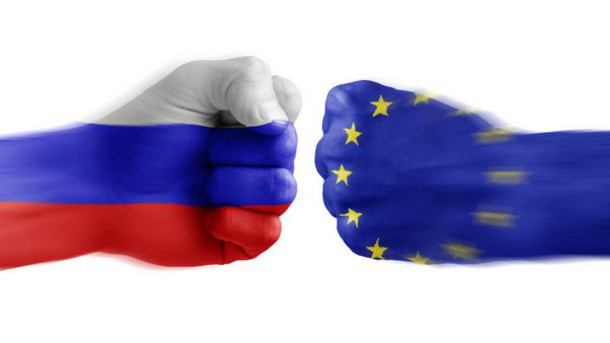
The concept
The food embargo is a sanction applied to a violator of international law. It means the cessation of the supply of certain goods from certain countries until the complete breakdown of trade relations. The food embargo was introduced by President V.V. Putin on August 6, 2014.
When will counter-sanctions be lifted?

When should our citizens wait for the lifting of counter-sanctions? It does not depend on us, but on Western countries. The lifting of sanctions against Russia will usher in the lifting of the food embargo. So far, the forecasts are disappointing. Our leadership hoped that the victory in the election of D. Trump in the United States would begin the process of establishing relations and ultimately lead to the lifting of all sanctions and counter-sanctions. Trump won, but this not only did not ease the pressure of the West on Russia, but, on the contrary, only strengthened it.
At first, the Russian media and politicians laughed at the restrictions of Western countries. Some were even proud to be on personal sanction lists. But after the introduction of sectoral sanctions and restrictions on long-term lending, the jokes immediately ended, and this topic in the media became “sacred”.
Who have we done worse?
The introduction of counter-sanctions has not improved the situation in our economy. Russia at the same time received a full list of “gifts”: the global energy crisis, which hit oil producing countries, sectoral sanctions on the export of metals, a ban on the import of equipment, the rejection of many international projects for the joint development and mining of minerals, the restriction on long-term lending to leading Russian banks and much more. To these problems, which already negatively affect our citizens, we ourselves have added a food embargo. Of course, I want to show the power and greatness of Russia, but counter-sanctions at best ruined a couple of farmers from Poland. But we got a huge increase in food prices across a multi-million dollar country.
List of products of the embargo of Russia
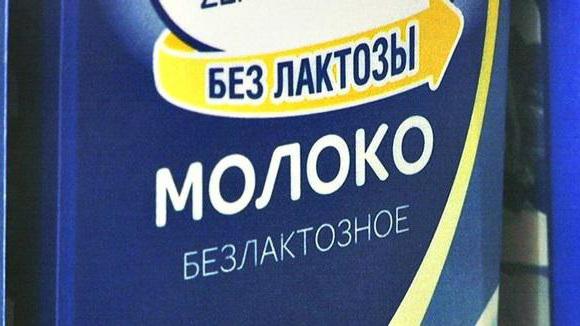
The list of goods prohibited for import into the Russian Federation in 2014 is still relevant today. We list the list of products that fall under counter-sanctions:

- Beef and poultry meat, as well as their offal - the heart, liver, lungs - in any form.
- Milk and dairy products.
- Representatives of the water world: crayfish, mollusks.
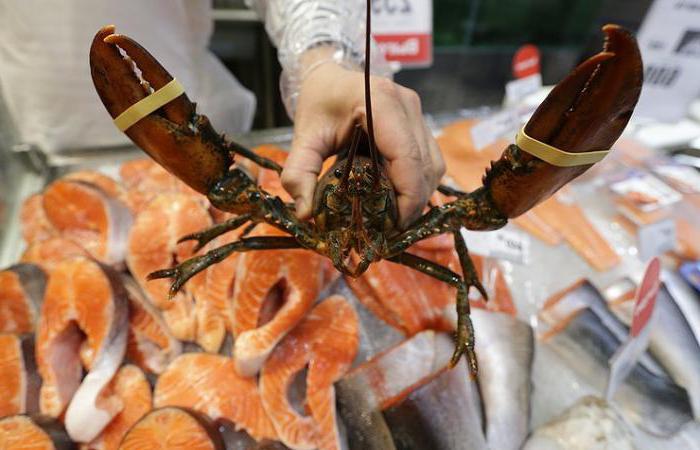
- Salmon, flounder, herring, fresh or chilled tuna.
- Many vegetable crops in different types: onions, tomatoes, cucumbers, beans, peas, cabbage of various types, etc.
- Fruits: bananas, avocados, dates, figs, etc.
- Nuts: cashews, walnuts, pistachios, areca, etc.
The list of products may be supplemented. In 2016, it was decided to include all sausage and finished products and semi-finished products in it. Since 2017, the import of almost all products from Ukraine is also prohibited. We will discuss this topic in more detail later in the article.
Products from Ukraine
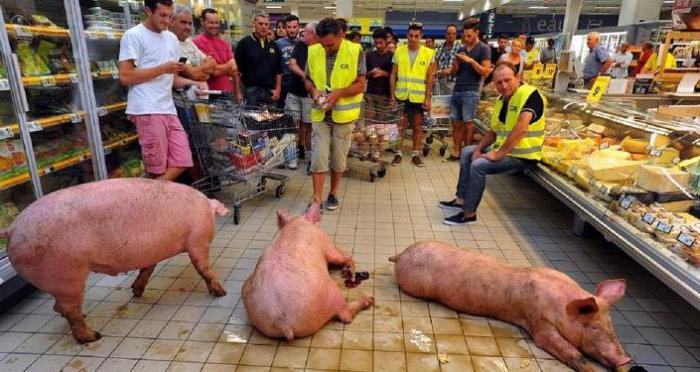
The food embargo also affected Ukraine.Bans on the import of certain products began in 2014. However, unlike the European list of counter-sanctions, which exists without any major changes and additions, Ukrainian is constantly expanding. For 3 years, he almost doubled.
First, the import of confectionery products of the brands “Conti” and “AVK” was banned. Then they used the old proven method: they connected the problem of Rospotrebnadzor G. Onishchenko, who, as always, could find components harmful to the health of our citizens in them. This method has always worked flawlessly: they found “harmful” substances in Georgian wines during the period of political aggravation with the Saakashvili regime; in Moldovan wines, when Moldova reached Europe; in American legs, when there was political intrigue at the Salt Lake City Olympics, etc.
In addition to sweets, it turned out that Ukrainians “poison” us with alcohol. Vodka, cognac, and beer were banned. The following brands have disappeared from our stores:
- "Khortytsa";
- Obolon;
- "Shustov";
- "Chernihiv".
It would seem that our citizens can sleep peacefully. G. Onishchenko again took care of our security. However, the war against “harmful” Ukrainian goods did not end. “Suddenly” it turned out that the goods imported from Ukraine — sunflower, soybean meal, corn grits, soybeans — did not meet the requirements in the field of phytosanitary conditions.
V. Putin during "direct" conversations with citizens stated that the ban on the import of products would not affect vital products. These include, for example, baby food. However, an exception was made here for “friends” from Ukraine: they banned the import of juices and baby food. The official reason for the restrictions has nothing to do with the embargo. These categories of goods did not comply with technical standards put forward by the Customs Union (CU). This means that formally the president did not deceive: the ban on the import of baby food into Russia is not associated with sanctions. It is noteworthy, but for several months the technical standards of the vehicle have not changed. Also, the method of producing goods at Ukrainian enterprises has not changed. In this way they made it clear what awaits our neighbors in case of refusal from the vehicle.
Moldova
Examples of food embargoes against the EU and Ukraine are not the only ones. The ban also affected Moldova. This country was "punished" for close rapprochement with the West. The list of banned goods from this country includes: wine, cherry, pears, peaches, thorns, apricots, finished pork products. The official reason for the ban is that under the guise of Moldavian products, goods from the EU are entering the Russian market.
Food embargo damage
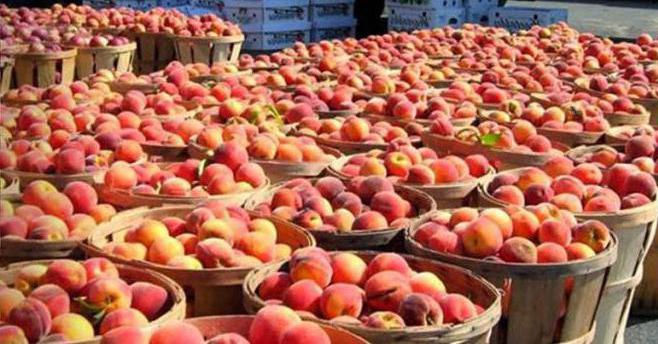
Economists and experts have calculated that Russia, with its “retaliatory strikes," only harmed itself. Europeans did not notice the loss of Russian markets. The Russian media is manipulating the situation: they give out any protests by European farmers for protests against anti-Russian sanctions. Experts from the Gaidar Institute, the Russian Presidential Academy of National Economy and Public Administration under the President of Russia and the All-Russian Academy of Foreign Trade of the Ministry of Economic Development calculated that European agricultural producers not only did not suffer losses associated with our “response measures”, but, on the contrary, were in the black as they found the best replacement for the Russian markets.
For many European farmers, the share of exports has indeed fallen, but this has nothing to do with counter sanctions. For example, agricultural exports in Slovakia fell by almost 30%, but our “merit” is only 0.8%. The loss of France is 15.6%, our share here is 0.9%. In other countries, the percentage of the Russian embargo is even less. Some countries bought goods from farmers who were destined for the Russian market and distributed them to charitable organizations.
Russia, however, inflicted tremendous harm on itself by such actions: prices in grocery stores increased by a third. Many Russian retailers suffered huge losses.Some of them went to international courts in order to force the Government of the Russian Federation to compensate for the losses incurred from such medieval measures of doing business.
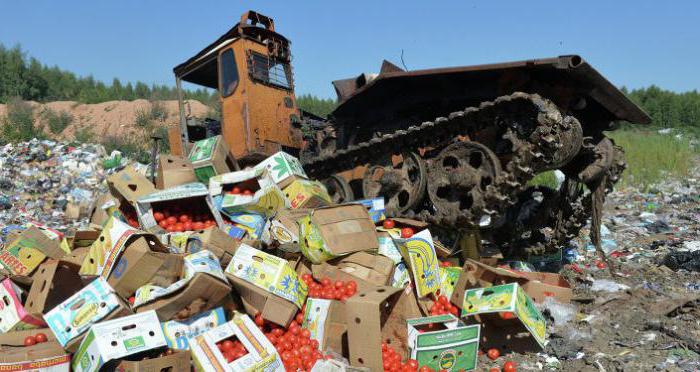
Summary
Sanctions and counter-sanctions have shown that our country is not great and powerful. It is enough to look at the numbers to make everything clear: the GDP of all of Russia is the GDP of New York alone.
In total, EU agricultural exports before the start of the trade war were estimated at 120 billion euros. Of these, Russia accounted for about 5 billion euros. Of course, many farmers who were tied only to Russia suffered greatly, but this is a small part of them. Most have found a replacement for our market. Due to Western sanctions, we lost about 75 billion euros in 2015, as well as 100 billion euros from the fall in oil prices. And this is only the official figure of the Ministry of Finance. The authoritative European magazine The Economist even estimates our losses at 1 trillion euros.